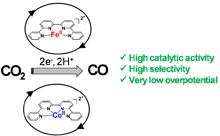Publication
850
ACS Catal., 8, 3411-3417, 2018
DOI:10.1021/acscatal.7b04412
|
|
|
|
|
|

|
Highly Selective Molecular Catalysts for the CO2-to-CO Electrochemical Conversion at Very Low Overpotential. Contrasting Fe vs. Co Quaterpyridine Complexes upon Mechanistic Studies
|
|
|
|
Claudio Cometto, Lingjing Chen, Po-Kam Lo, Zhenguo Guo, Kai-Chung Lau, Elodie Anxolabéhère-Mallart, Claire Fave, Tai-Chu Lau and Marc Robert
Univ Paris Diderot, Sorbonne Paris Cité, Laboratoire d'Electrochimie Moléculaire, UMR 7591 CNRS, 15 rue Jean-Antoine de Baïf, F-75205 Paris Cedex 13, France
Department of Chemistry, Institute of Molecular Functional Materials, City University of Hong Kong, Tat Chee Avenue, Kowloon Tong, Hong Kong (China)
School of Environment and Civil Engineering, Dongguan University of Technology, Guangdong, 523808, China
[MII(qpy)(H2O)2]2+ (M = Fe, Co; qpy: 2,2´:6´,2´´:6´´,2´´´-quaterpyridine) complexes efficiently catalyze the electrochemical CO2–to–CO conversion in acetonitrile solution in the presence of weak Brönsted acids. Upon performing cyclic voltammetry studies, controlled-potential electrolysis and spectroelectrochemistry (UV-visible and infrared) experiments together with DFT calculations, catalytic mechanisms were deciphered. Catalysis is characterized by high selectivity for CO production (selectivity > 95 %) in the presence of phenol as proton source. Overpotentials as low as 240 mV and 140 mV for the Fe and Co complexes respectively led to large CO production for several hours. In the former case, the one-electron-reduced species binds to CO2 and CO evolution is observed after further reduction of the intermediate adduct. A deactivation pathway has been identified, due to the formation of a Fe0qpyCO species. With the Co catalyst, no such deactivation occurs and the doubly reduced complex activates CO2. High scan rate cyclic voltammetry allows reaching kinetic conditions, leading to scan rate independent plateau shaped voltammograms from which catalytic rate constant was obtained. The molecular catalyst is very active for CO production (turnover a frequency of 3.3 x 104 s-1 at 0.3 V overpotential), as confirmed by catalytic a Tafel plot showing a comparison with previous catalysts. |

